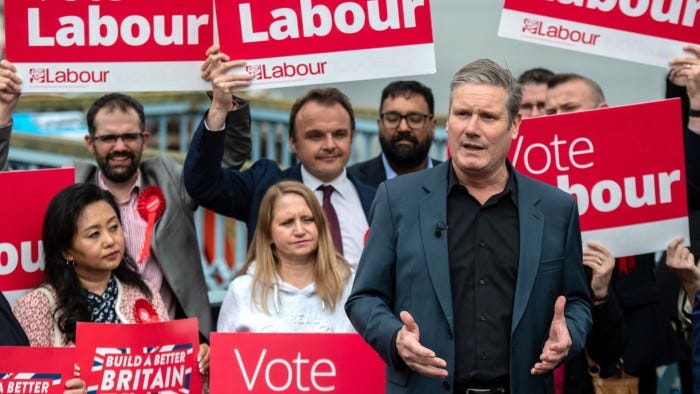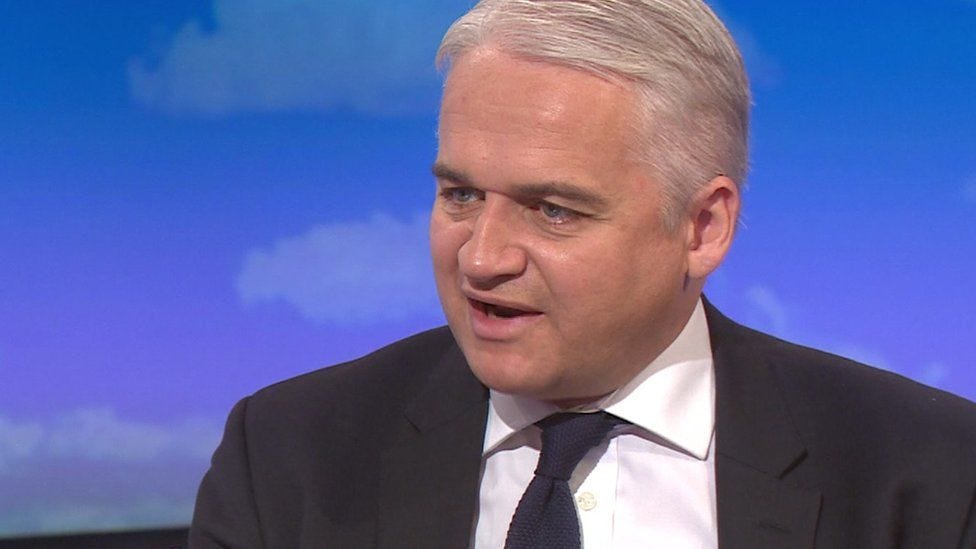Predictions and desired outcomes are not the same thing at election time
Commentary has room for evidence-based conclusions and hypotheses based on instinct or aspiration, but we need always to be clear which we are dealing with
In beginning my recent essay about potential new and returning Labour MPs after the general election, I said that I was using the party’s comfortable victory as a hypothesis without necessarily endorsing the idea. I mentioned that my own predictions were “complex” and in that context beside the point. I could also have said, but didn’t, that I find it difficult but necessary to draw clear distinctions among 1) what I would like to happen, 2) what the evidence I’ve seen suggests will happen, filtered through my judgement and experience, and 3) my gut instinct.
That last element, instinct, is important, because the longer you observe anything—in this case, politics—and the more you learn and remember, the more you develop a kind of intuition or feeling which is sometimes impossible to rationalise or articulate, and which is by no means unerring, but which can sometimes be unexpectedly right. In 1996, for example, I had a hunch that Benjamin Netanyahu would win Israeli’s first direct election for the post of prime minister, despite the eminence and experience of Labor’s Shimon Peres; and so he did, narrowly, by 50.5 per cent to 49.5 per cent. I can rationalise my feeling post hoc but it was not so easy at the time. Yet I was right when many were wrong. I wrote at length about this unquantifiable instinct a couple of weeks ago.
(This is not some self-congratulatory paean: I also though the Conservatives might hang on at the eleventh hour in May 1997, and that Bill Clinton had done enough damage to his reputation and America’s sense of decency that the voters would turn to the unimpeachably respectable Second World War veteran Bob Dole, the 73-year-old Republican candidate. That proved not to be entirely accurate, as Clinton won 31 states and by 379 to 159 in the Electoral College, outpacing Dole by more than eight million votes.)
I have also stressed increasingly frequently that those of us in the overcrowded and mixed-ability field of political commentary have an overriding duty to be intellectually honest. If we don’t do that, we’re simply propagandists, and there is nothing wrong with being a professional advocate, but you should be open about your status as such. An example passed in front of me earlier: someone I follow on Twitter highlighted, with due mockery, a report in which the SNP’s Stewart Hosie made a series of extremely optimistic—most would agree unrealistic—predictions about his party’s prospects for the forthcoming general election. The polls have generally shown the SNP’s lead over Scottish Labour dwindling since Humza Yousaf became leader in March 2023, and two samples this year have put Labour narrowly ahead while another two have shown the parties tied.
Hosie is an elected politician, though, so we know there are limits to what he can say. I don’t know if he said anything he thinks to be genuinely untrue, but everyone understands that he must be upbeat and minimise the SNP’s challenges. As I said in response to the tweet, if he was honest and said that it was a tough time for the SNP, that they had made some mistakes recently and would struggle in the election against a resurgent Scottish Labour and a slick and plausible Anas Sarwar, then the media would have trumpeted a disastrous “gaffe” by a senior Nationalist, exposing defeatism at the heart of the SNP.
Commentators are not the same. If we’re not communicating what we honestly think, what’s the point? That’s not to say we’re independent or bias-free, nor that we can’t support political parties or ideological positions. But I apply the argument I always use for Members of Parliament and the Register of Interests: so long as something is publicly acknowledged, then any audience can take the open facts into account and make up their own minds about what someone is saying. You are wholly at liberty to dismiss what I say or any conclusions I draw on the grounds that I’m a Tory, but I would argue 1) that’s a very lazy and limited approach to argumentation and debate, and 2) I’ve never pretended to hold views I don’t hold (or said I don’t hold views I do hold), at least not as long as I’ve offered my own views on political life.
All of this was in my mind when I read an article in The Spectator on Sunday by Patrick O’Flynn entitled “Why a Labour super-majority is unlikely”. O’Flynn, once political editor of The Daily Express then a UKIP Member of the European Parliament, is always trenchant and bracing but I often disagree with him, but I was interested in this article because the headline nudges towards what I more or less think about the election. I will try to summarise O’Flynn’s argument fairly:
Opinion polls currently show the Labour Party on course to win more than 400 seats at the election, with some even hinting at more than 500.
This enormous preponderance is matched, or mismatched, by a projected vote share of around 45 per cent, which is partly attributable to our first-past-the-post electoral system.
There is no substantial evidence of widespread enthusiasm within the electorate for Labour or Sir Keir Starmer personally.
I agree with all of these points: they are uncontroversial and would take some effort and intellectual ability to contradict. But it is at this point that O’Flynn becomes more, well, I’ll say tendentious.
Recently “there are multiple signs of the opposition party misreading the public mood”. He highlights Wes Streeting’s unedifyingly gleeful reaction to the attempts to suppress National Conservatism’s recent conference in Brussels and, last year, Rachel Reeves’s portrayal of former NatWest CEO Dame Alison Rose as the victim of sexism and misogyny in the furore over Nigel Farage being “debanked” by Coutts and Co. “Both these incidents involved key Labour figures failing a normal person’s ‘sniff test’ for whether a politician can be trusted to defend right from wrong.”
This supposed dedication by the Labour Party to totemic “progressive” policies will become more obvious: “there is every reason to think that further examples of Labour’s basic woke-left weirdness will come to light in the run up to polling day”. All of this will mount up and “will cause further disquiet about the party’s suitability for power”.
Given that Reform UK is not currently polling strongly enough to pose a realistic alternative to the Conservative Party, as opposed to a spoiler and a release valve for anger and disappointment, “the ‘hold your nose and vote Tory’ factor is likely to make another appearance… so long as the Tories can reach the start of the campaign in a clear second place in nationwide polls, it surely will be enough to keep Starmer below 400 seats”.
Now, let me be clear that I am not saying that O’Flynn is categorically wrong. But I think his reasoning is faulty. And you can see the lacunae. He starts by citing the opinion polls, which, however flawed, are based on hard evidence. He then says that he doesn’t think that evidential basis will translate into the obvious results, and his reasoning is that Labour will fall foul of a “normal person’s ‘sniff test’”. Note that no statistics are adduced any more, no even indicative numbers from no-doubt-flawed polling. We are into the realm of what I think of as “I-reckon” argumentation, where opinion is presented as something rather more heavyweight.
O’Flynn of course is entitled to his opinion on the result of the next election, and as a former Fleet Street political editor he should be heard. But it is interesting that in the space of a few hundred words he moves from “I think” to “every reason to think” to “likely” to “surely”. This sounds to me like he’s convincing himself of the power of his argument and reading the certainty he reaches back to the beginning of his article.
I realise that qualifying opinions or admitting too freely the weaknesses of your own argument is not fashionable in journalism. I certainly don’t present myself as faultless. But in my assessment of the likely result of the general election I try to rely much more heavily on what evidence we can distil and adduce, and admit much more freely that my gut instincts are just gut instincts. I absolutely would not slap the labels “likely” or “surely” on hypotheses which are at best punchy and at worst counter-intuitive.
This only matters because, in a society in which people have little time and less trust for politics, politicians and political institutions, many people will look to commentators like O’Flynn for analysis, either to inform or reinforce their views. If they are presented with a bill of fare which can be taken in the wrong context—opinion and fact becoming dangerously difficult to distinguish—then they cannot be expected to act in a rational or informed way. And that affects us all. This has an easy-but-difficult remedy: those who weigh in on politics need to practise brutal, rigorous intellectual honesty. Otherwise, what’s the point?





